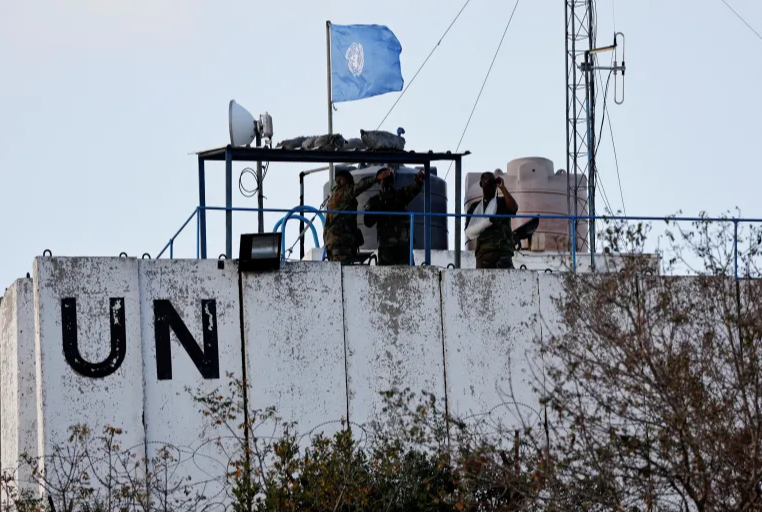
UNIFIL peacekeepers look at the Lebanon-Israel border from a watchtower in the town of Marwahin, southern Lebanon [File: Thaier Al-Sudani/Reuters]
Beirut, October 16 (RHC)-- Prime Minister Benjamin Netanyahu is pushing for the removal of UN peacekeepers as Israel escalates its attacks in southern Lebanon. Experts believe this is aimed at removing international observers who could keep a record of Israel’s actions on Lebanon.
About 10,000 members of the United Nations Interim Force in Lebanon (UNIFIL) are present in a territory stretching for more than 1,000 square kilometres (386 square miles) between Lebanon’s de facto southern border and the Litani River.
Israel has fired on several front-line UNIFIL positions since it launched a ground incursion into southern Lebanon in early October, claiming it aims to dismantle the infrastructure of Hezbollah, a Lebanese group that has been trading fire with the Israeli army in solidarity with Palestinians in Gaza.
Earlier this week, Netanyahu said that he demands that UN chief Antonio Guterres get UNIFIL troops out of “combat zones,” alleging that their presence was providing a “human shield” for Hezbollah.
But the UN says the mission – with members from 50 countries – is not going anywhere. “The UN flag continues to fly,” UN secretary-general spokesperson Stephane Dujarric said on Sunday.
A high-ranking diplomatic source, who requested anonymity, told Al Jazeera that UNIFIL’s mandate is part of the international order and removing it would give Israel “an easy win after its unacceptable behaviour”.
UNIFIL was set up by the UN in 1978, after the first Israeli occupation of southern Lebanon, to confirm the pullout of Israeli forces, maintain peace and assist the Lebanese government in restoring authority.
Israel invaded Lebanon again in 2006, and the UN Security Council adopted Resolution 1701, expanding UNIFIL’s mandate to monitor the ceasefire and guarantee that no armed force other than the Lebanese army was present in the area – meaning no Hezbollah or Israeli fighters in the south.
UNIFIL was only ever meant to provide a framework for the Lebanese and Israelis to resolve their differences and facilitate the establishment of Lebanese army control south of the Litani River but that never happened, with both Hezbollah and Israel routinely violating the resolution and the army remaining on the sidelines.
The string of recent Israeli attacks, which UNIFIL said were intentional, has been widely condemned as a flagrant violation of international law.
Shane Darcy, senior lecturer at the Irish Centre for Human Rights, in the National University of Ireland Galway, said getting UNIFIL out of the way would make it impossible to monitor international law violations as Israel ramps up its attacks in southern Lebanon.
“The exclusion of outside observers, whether it is journalists or UN peacekeepers, seems a deliberate strategy to limit the scrutiny of Israeli forces at a time when they are most needed,” Darcy added.
This would be in line with a pattern of exclusion already seen in Gaza, where Israel has killed at least 175 journalists, according to the Palestinian media office in Gaza, and barred international reporters and UN human rights observers. In Lebanon, there have also been deadly Israeli attacks against journalists.
The International Court of Justice in May ordered Israel “to ensure the unimpeded access to the Gaza Strip of any commission of inquiry, fact-finding mission or other investigative body mandated by competent organs of the United Nations to investigate allegations of genocide.” Israel has not complied with this demand.
“There have already been appalling breaches of international humanitarian law and the risk of further atrocities can only increase when the eyes of the world are deliberately blocked,” Darcy said.
Israel has denied allegations that it deliberately harmed peacekeepers but the push for their removal comes as it keeps issuing forced evacuation threats to people in southern Lebanon – again similar to the warnings for people in Gaza to flee their homes or face bombardment.
According to a tally compiled by Al Jazeera, the Israeli army has over the past two weeks issued such orders for at least 233 villages – an area that the UN estimates covers a quarter of Lebanon’s territory.
“If they manage to get civilians to leave, including peacekeepers, they can stay for as long as they want till they get some deal they want,” said Rob Geist Pinfold, lecturer in international peace and security at Durham University.
That could be a political settlement that sees Hezbollah withdraw north of the Litani River, Pinfold added, noting that Israel views UNIFIL’s presence as an “impediment” to its advance.
Having UNIFIL in a live war zone means the peacekeepers could be hit by accident, which could result in significant pressure on Israel to constrain or end its military campaign, Pinfold said.
Richard Gowan, the UN director at the International Crisis Group, said Israel has long been “frustrated that UNIFIL has not stopped Hezbollah from establishing strong positions” south of the Litani River. “I suspect that Israel will argue that UNIFIL should either be given a more robust mandate to tackle Hezbollah or, alternatively, a new non-UN-commanded force should deploy to secure southern Lebanon,” Gowan added.
Addressing reporters in New York on Monday, UN peacekeeping chief Jean-Pierre Lacroix rejected suggestions that UNIFIL was to blame for the non-implementation of Resolution 1701.
“[It] was never its mandate,” he said, clarifying that UNIFIL’s mandate has been “to support” the parties in the implementation of the resolution and not to enforce it.
“It is important in relation to our current decision to stay in the position because we all hope that there will be a return to the negotiating table and that there will be finally a real effort towards the full implementation of Resolution 1701,” Lacroix added.
In a statement on Monday, the UN Security Council expressed support for UNIFIL following the Israeli attacks and urged “all parties” to respect the safety and security of the mission.
“UN peacekeepers and UN premises must never be the target of an attack,” said the 15-member body.

